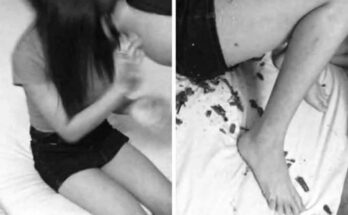Bedwetting, also known as nocturnal enuresis, is a common concern among parents of young children. While it is a natural part of development for many kids, frequent bedwetting can lead to frustration, embarrassment, and disrupted sleep. If you’re looking for a natural and effective way to help your child stay dry at night, this simple cinnamon and honey drink might be the solution you’ve been searching for!
Why Do Children Wet the Bed?
Bedwetting can be caused by several factors, including:
-
Underdeveloped bladder control – Some children’s bladders take longer to develop the ability to hold urine throughout the night.
-
Deep sleep patterns – Kids who are deep sleepers may not wake up when their bladder is full.
-
Hormonal imbalance – Low levels of antidiuretic hormone (ADH) can lead to excessive urine production at night.
-
Dietary and fluid intake – Drinking too many fluids, especially sugary or caffeinated drinks, close to bedtime can increase the likelihood of accidents.
-
Stress or anxiety – Emotional stress, such as changes at home or school, can contribute to bedwetting episodes.
While there are many approaches to managing bedwetting, some parents have found relief through natural remedies like this cinnamon and honey bedtime drink.
How Cinnamon and Honey Help Prevent Bedwetting
1. Cinnamon – A Natural Bladder Regulator
Cinnamon has been used in traditional medicine for centuries due to its anti-inflammatory and antibacterial properties. When it comes to bedwetting, cinnamon may help by:
✅ Warming the body – Some experts believe that keeping the body warm can reduce excessive urination at night.
✅ Supporting bladder health – Cinnamon has mild astringent properties that may help strengthen the bladder muscles.
✅ Balancing blood sugar levels – Fluctuations in blood sugar can contribute to frequent urination. Cinnamon helps regulate these levels.
2. Honey – A Natural Moisture Absorber
Honey is known for its numerous health benefits, including its ability to:
🍯 Retain moisture – Honey has hygroscopic properties, meaning it can help the body absorb and retain fluids, reducing excessive urination at night.
🍯 Calm the nervous system – Honey contains natural sugars that help relax the body and promote deeper sleep, making it easier for children to wake up when their bladder is full.
🍯 Boost immunity – The antibacterial properties of honey help support overall health.
How to Make the Cinnamon and Honey Drink for Bedwetting
This easy-to-make drink is a safe and natural remedy to help reduce nighttime accidents.
Ingredients:
✔️ 1 ½ cups of water
✔️ ½ teaspoon of cinnamon powder (or a small cinnamon stick)
✔️ 1 teaspoon of honey
Instructions:
1️⃣ Bring 1 ½ cups of water to a boil.
2️⃣ Add ½ teaspoon of cinnamon powder (or a small cinnamon stick).
3️⃣ Let it simmer for 15 minutes on low heat.
4️⃣ Strain the cinnamon if using a stick.
5️⃣ Pour into a cup and let it cool slightly.
6️⃣ Stir in 1 teaspoon of honey.
7️⃣ Give this drink to your child 2 hours before bedtime.
🌟 Tip: Encourage your child to use the bathroom before sleeping to maximize the effects of this remedy.
Additional Tips to Prevent Bedwetting
While this drink can be a great natural aid, combining it with healthy habits will yield even better results:
🔹 Limit fluids before bedtime – Encourage your child to drink more during the day and reduce intake 1-2 hours before sleep.
🔹 Encourage regular bathroom breaks
– Ensure your child empties their bladder before bed.
🔹 Create a bedtime routine – A structured evening routine can help the body regulate nighttime bladder control.
🔹 Reduce stress – Comfort and reassure your child to prevent anxiety-related bedwetting.
🔹 Use a reward system – Praise or small incentives can help encourage dry nights.
Final Thoughts
Bedwetting is a common phase in childhood, and while it usually resolves on its own, natural remedies like this cinnamon and honey drink can offer extra support. With consistent use and healthy bedtime habits, many parents have reported fewer nighttime accidents and more restful sleep for their children.
If your child continues to struggle with persistent bedwetting, consider consulting a pediatrician to rule out underlying medical conditions.
Would you try this natural remedy? Let us know in the comments below! 😊👶💤




